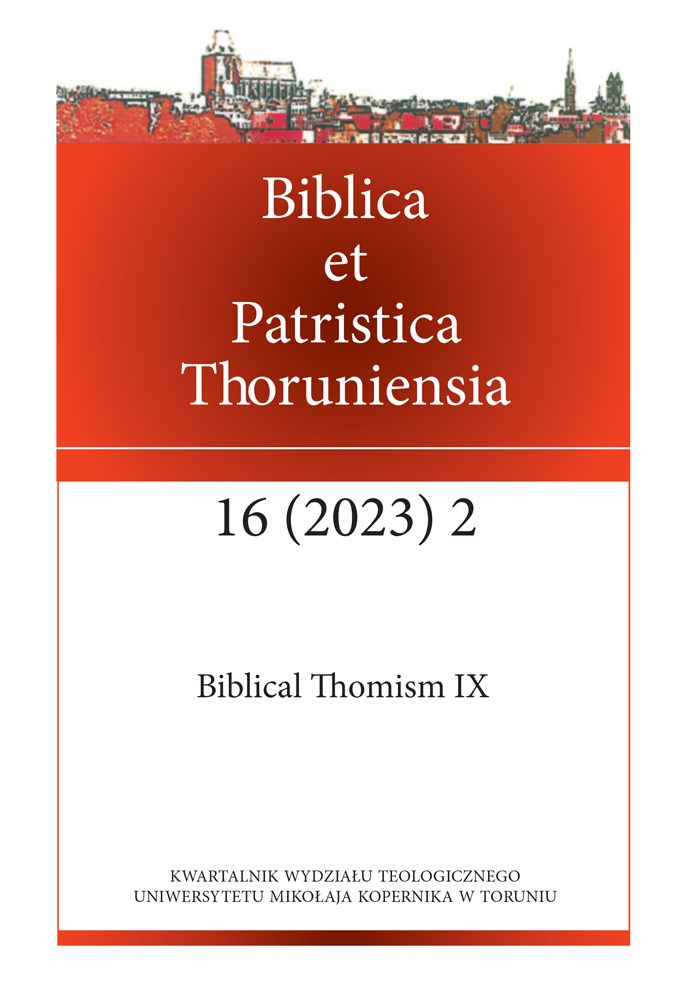Finding Common Ground: Humanity’s Relationship with Nature. A Comparison of Thomas Aquinas and Environmental Ethics
DOI:
https://doi.org/10.12775/BPTh.2023.011Keywords
common good, responsibility, natural resources, Thomas Aquinas, environmental ethicsAbstract
The environmental issues and human responsibility in the use of resources and environmental sustainability have become increasingly relevant and pressing due to the accelerated pace of industrialization and urbanization, and the growth of the world population. The lack of adequate planning dampens the impact on the environment, leading to the depletion of natural resources and environmental degradation, generating social and economic inequalities. In this context, the global community has to deal with countless commitments in their attempt to ensure a fair distribution of resources and opportunities. The thought of Thomas Aquinas, and its interpretation by contemporary thinkers, propose ethical principles that derive from the natural world itself and guide human behavior towards the realization of the common good, with significant implications for environmental ethics. The idea that the natural world exists for the benefit of all human beings, and that it is human responsibility to use it in a way that promotes the common good, remains a timely and valuable perspective in current discussions about ecological responsibility
References
Berkman, John, y Robyn Boeré. 2020. “St. Thomas Aquinas on Impairment, Natural Goods, y Human Flourishing.” The National Catholic Bioethics Quarterly 20 (2): 311–28.
Berry, Wendell. 2015. The Unsettling of America: Culture & Agriculture. Catapult.
Cristóvam, José Sérgio Da Silva. 2019. “Sobre a Noção de Bem Comum No Pensamento Político Ocidental: Entre Becos e Encruzilhadas Da Dimensão Ancestral Do Moderno Conceito de Interesse Público.” Revista de Investigações Constitucionais 6 (1): 107. https://doi.org/10.5380/rinc.v6i1.57508.
Daguet, François. 2020. “Heurs et Malheurs Du Bien Commun: De Thomas d’e Aquin à Vatican II.” Revue Thomiste, 255–308.
Didikin, Anton. 2020. “Natural law as a way to achieve the common good: an interpretation of Thomas Aquinas y John Finnis arguments.” ΣΧΟΛΗ. Ancient Philosophy and the Classical Tradition 14 (2): 609–17. https://doi.org/10.25205/1995-4328-2020-14-2-609-617.
Dodds, Michael J. 2020. The One Creator God in Thomas Aquinas and Contemporary Theology. Catholic University of America Press.
Dodds, Michael J. 2021. “The Reception of Aquinas in the Philosophy of Nature and Science.” In The Oxford Handbook of the Reception of Aquinas, edited by Matthew Levering and Marcus Plested, 538–53. Oxford University Press. https://doi.org/10.1093/oxfordhb/9780198798026.013.33.
Enríquez Gómez, María Teresa, y Jorge Martín Montoya Camacho. 2021. “Imperio y Causalidad En Tomás de Aquino.” Scientia et Fides 9 (1): 329–55. https://doi.org/10.12775/SetF.2021.013.
George, Marie. 2019. “Is Eco-Theologian Thomas Berry a Thomist?” Scientia et Fides 7 (1): 47. https://doi.org/10.12775/SetF.2019.003.
Keys, Mary M. 2008. Aquinas, Aristotle, and the Promise of the Common Good. Cambridge (GB): Cambridge University Press.
Kılınç, Yurdagül. 2022. “Aquinas, Aristotle, and the Promise of the Common Good.” Hitit Theology Journal 21 (1).
Köhler, Theodor. 2022. Grundlagen Des Philosophisch-Anthropologischen Diskurses Im Dreizehnten Jahrhundert: Die Erkenntnisbemühung Um Den Menschen Im Zeitgenössischen Verständnis. Brill.
Moltmann, Jürgen. 2014. “Die Hoffnung Der Erde Die Ökologische Wende Der Christlichen Theologie Und Der Christlichen Spiritualität.” Evangelische Theologie 74 (3): 216–26. https://doi.org/10.14315/evth-2014-0307.
Roszak, Piotr. 2011. “Creación Como Relatio, Assimilatio y Processio. En Torno a La Exégesis de Santo Tomás de Aquino al Gen 1, 1–2, 3.” Biblica et Patristica Thoruniensia 4: 181–99.
Roszak, Piotr. 2022a. “Imperfectly Perfect Universe? Emerging Natural Order in Thomas Aquinas.” HTS Teologiese Studies / Theological Studies 78 (2). https://doi.org/10.4102/hts.v78i2.7199.
Roszak, Piotr. 2022b. “¿Nueva Creación – «ex Vetere» or «ex Nihilo»? El Sentido de La Vida Terrena y La Nueva Creación Según Santo Tomás de Aquino.” Scripta Theologica 54 (3): 585–606. https://doi.org/10.15581/006.54.3.585-606.
Santori, Paolo. 2020. “Donum, Exchange and Common Good in Aquinas: The Dawn of Civil Economy.” The European Journal of the History of Economic Thought 27 (2): 276–97. https://doi.org/10.1080/09672567.2020.1720764.
Schweiker, William. 2018. “The Destiny of Creation: Theological Ethical Reflections on Laudato Si: The Destiny of Creation.” Journal of Religious Ethics 46 (3): 479–95. https://doi.org/10.1111/jore.12228.
Selwyn, Neil. 2019. “What’s the Problem with Learning Analytics?” Journal of Learning Analytics 6 (3). https://doi.org/10.18608/jla.2019.63.3.
Thompson, Christopher J. 2017. The Joyful Mystery: Field Notes Toward a Green Thomism. Emmaus Road Publishing.
Tomás de Aquino. (2000 ). S. Thomae de Aquino Opera Omnia (Ed. Enrique Alarcón). Pamplona: Corpus Thomisticum: www.corpusthomisticum.org.
Downloads
Published
How to Cite
Issue
Section
License
Copyright (c) 2023 ALBERTO RAMIREZ, CARLOS MARIO TORO GONZALEZ, FREDDY CAMILO TRIANA DOMINGUEZ

This work is licensed under a Creative Commons Attribution-NoDerivatives 4.0 International License.
CC BY ND 4.0. The Creator/Contributor is the Licensor, who grants the Licensee a non-exclusive license to use the Work on the fields indicated in the License Agreement.
- The Licensor grants the Licensee a non-exclusive license to use the Work/related rights item specified in § 1 within the following fields: a) recording of Work/related rights item; b) reproduction (multiplication) of Work/related rights item in print and digital technology (e-book, audiobook); c) placing the copies of the multiplied Work/related rights item on the market; d) entering the Work/related rights item to computer memory; e) distribution of the work in electronic version in the open access form on the basis of Creative Commons license (CC BY-ND 3.0) via the digital platform of the Nicolaus Copernicus University Press and file repository of the Nicolaus Copernicus University.
- Usage of the recorded Work by the Licensee within the above fields is not restricted by time, numbers or territory.
- The Licensor grants the license for the Work/related rights item to the Licensee free of charge and for an unspecified period of time.
FULL TEXT License Agreement
Stats
Number of views and downloads: 750
Number of citations: 0



